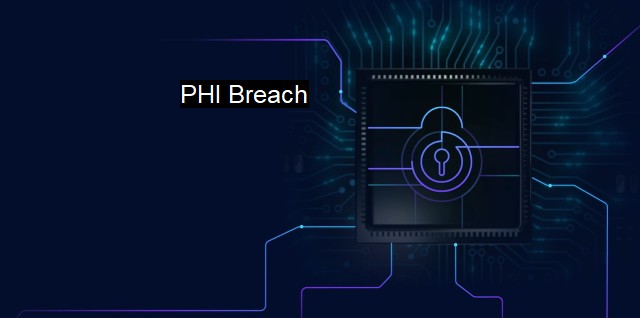What is PHI Breach?
The Criticality of Protected Health Information (PHI) Protection and Breach Management in Healthcare: Risks, Laws, and Consequences
A PHI (Protected Health Information) breach involves unauthorized access, use, or disclosure of individually identifiable health information. With the health sector rapidly transitioning to digital record-keeping and electronic communication, cybersecurity has become an indispensable component of healthcare. Symptom analysis, prescription orders, test results, and other health information now inhabit numerous servers. Despite the robust convenience attributed to this digital transition, concerns have gravitated towards the safeguarding of these sensitive data.Through cybersecurity and antivirus mechanisms, healthcare institutions aim to repel PHI breaches and uphold the integrity of their patients' confidential data. Despite these precautions, PHI breaches continue to occur, prompting industry calls for advancements in cybersecurity frameworks to protect against such risks.
Following the HIPAA (Health Insurance Portability and Accountability Act) in the United States, any unauthorized access or unwarranted exposure to health information constitutes a PHI breach. This incident can occur through several avenues, including cyber attacks such as hacking, digital espionage, insider leaks, or unintended disclosure through mishandling. Once a breach occurs, the compromised health entity is obliged under HIPAA to notify those affected, as well as the Department of Health & Human Services and possibly public media platforms.
Cybersecurity develops as most healthcare providers engage increasingly sophisticated technologies, opening doors to potential threats. Cybersecurity broadly includes network security, application security, information security, operational security, disaster recovery, and business continuity. any intrusion into these systems that infringes upon patient information is recognized as a breach of PHI.
Antivirus products are included in this cybersecurity arrangement, designed to resist false attempts at data breach. Primarily developed to protect against invasive software (or malware), antivirus solutions scan data and systems for suspicious activities. PHI breaches may operate subtly, employing numerous tactics that aren't easily detected by traditional defenses. Advanced Persistent Threats (APT), phishing attempts, ransomware, spyware, adware, and Trojans can compromise PHI and adjust rapidly to surpass standard antivirus architectures.
The advancement and ubiquity of technology also make mobile, cloud, and IoT data extremely vulnerable to PHI breaches. As usage grows, sensitive healthcare data available in mobile networks, remote servers, and internet-connected devices multiply the potential gateways for unauthorized breaches. While security controls have been warranted for all data systems (endpoint protection, encryption, etc.), the potential for infringements remains persistent.
The after-effects of a PHI breach extends beyond the immediate monetary costs incurred by penalties levied by HIPAA or similar international ethical protocols. It tarnishes the reputation and credibility of the breached institution. Patients are entitled to trust health personnel with their medical information. these breaches can seriously curtail that faith and people could start resorting to withholding crucial information to preserve their privacy, leading to sub-optimal healthcare outcomes.
PHI provides hackers with comprehensive, lucrative data including addresses, referrals, insurance details, treatments histories, etc. If cyber-criminals manage to create profitable enterprises from stolen PHI, they inadvertently reinforce these illegal moves and spiral up the malicious market.
To counteract PHI breaches, healthcare institutions require comprehensive cybersecurity systems and antivirus measures that can adapt ahead of malicious players. Security systems need to be repeatedly stress-tested, and personnel across departments must receive proper education on the protocols of preserving patient privacy, recognizing potential threats, and adhering to a rapid, confidential response plan should a breach occur.
A PHI Breach is a severe intrusion that not only compromises sensitive patient information but also highlights the vulnerabilities in the complex digital networks of modern healthcare institutions. Concerted efforts from the healthcare, cybersecurity and legal communities are necessary to safeguard the sanctity of patient data from these attacks.

PHI Breach FAQs
What is a Phi breach?
A Phi breach is a type of security breach that involves the unauthorized access or disclosure of personal health information (PHI). PHI is any information related to an individual's health status, medical conditions, treatments, or billing information.What are the consequences of a Phi breach?
A Phi breach can have serious consequences for both individuals and organizations. Individuals may suffer from identity theft, financial fraud, or damage to their reputation. Organizations may face legal and financial penalties, as well as damage to their reputation and customer trust.How can organizations prevent Phi breaches?
Organizations can prevent Phi breaches by implementing strong cybersecurity measures, such as firewalls, antivirus software, and intrusion detection systems. They should also train their employees on best practices for handling and protecting PHI, and conduct regular security audits and risk assessments.What should individuals do if they suspect a Phi breach?
If individuals suspect a Phi breach, they should immediately contact their healthcare provider or insurer to report the incident and request a copy of their medical records to check for any unauthorized activity. They should also monitor their financial and personal information for any suspicious activity and consider placing a fraud alert or security freeze on their credit report.| | A | | | B | | | C | | | D | | | E | | | F | | | G | | | H | | | I | | | J | | | K | | | L | | | M | |
| | N | | | O | | | P | | | Q | | | R | | | S | | | T | | | U | | | V | | | W | | | X | | | Y | | | Z | |
| | 1 | | | 2 | | | 3 | | | 4 | | | 7 | | | 8 | | |||||||